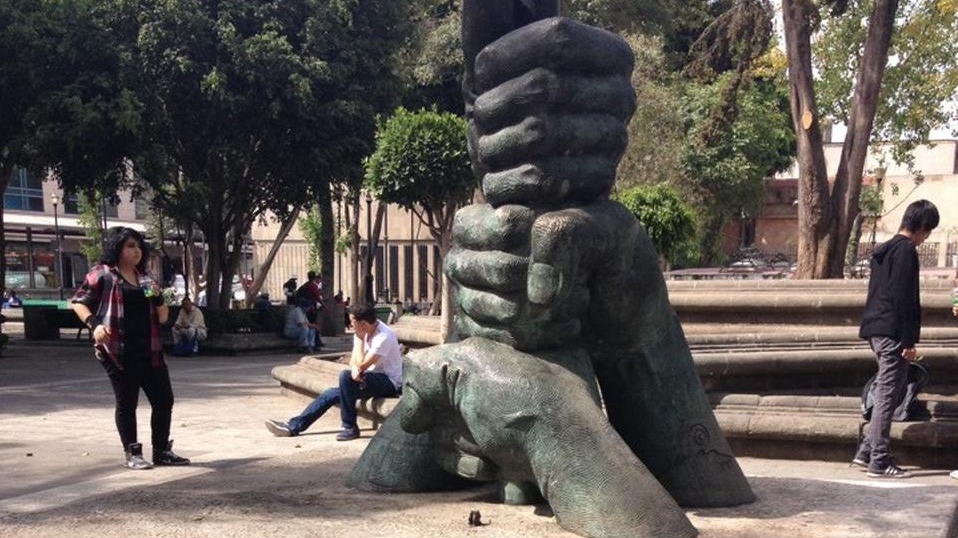
_
La Plaza de la Solidaridad funciona como un añadido al suroeste de la Alameda Central. Su historia es mucho más reciente y trágica, pues es el lugar donde se derrumbó el Hotel Regis.
La plaza fue, en su momento, parte del Monasterio de San Diego, hoy Laboratorio de Arte de Alameda. Gran parte de estos terrenos fue posteriormente subdividida y utilizada para las oficinas del periódico El Imparcial. Unas décadas más tarde se transformó en el Hotel Regis, el cual fue ampliado a principios de 1908 y modernizado varias veces a lo largo de su historia.
En los años 50, era un edificio emblemático de ocho plantas, junto con el edificio de siete plantas de los grandes almacenes Salinas & Rocha que funcionaban desde 1946. También competía con el Hotel Prado Misión en la misma zona. Los tres prominentes negocios funcionaron hasta el 19 de septiembre de 1985, cuando todas las estructuras se derrumbaron como consecuencia del terremoto. Toda la cuadra fue testigo de explosiones, incendios y su reducción a escombros. Las imágenes memorables del cartel del “Hotel ЯHR Regis”, que históricamente se mantuvo en el techo del hotel después de caer al nivel de la calle, transmitieron inmediatamente la escala de la destrucción que sacudió a la nación.
Los restos de 136 fallecidos fueron retirados de los edificios, sin embargo, se cree que decenas se perdieron en el desastre. El solar en ruinas fue expropiado por el Ayuntamiento poco después del terremoto y se convirtió prácticamente en un símbolo y un recordatorio del fatídico día y de las vidas perdidas. La Plaza de la Solidaridad estuvo lista sólo un año después. En 1991 se colocó un monumento dedicado al espíritu de solidaridad de los habitantes y rescatistas de la Ciudad de México, que aún se encuentra en el centro de la plaza.
Al norte del parque, en el lado oeste, se encuentra el Museo Mural Diego Rivera. Aquí se encuentra el mural que se terminó en 1947 para el Hotel del Prado. Frente al museo, el parque acoge a aficionados al ajedrez de toda la ciudad. En un día normal se ven decenas de partidas cuidadosamente deliberadas.
Al caer el sol, la mayoría de las noches verás contingentes de sonideros compitiendo, auténticos DJ’s. La música elegida suele ser guaracha y cumbia. Pasa por allí para presenciar algo de esto. La única restricción para participar es saber bailar. El espectáculo ofrece a la mayoría de los espectadores una imagen muy tranquilizadora sobre la naturaleza de la solidaridad en la Ciudad de México.
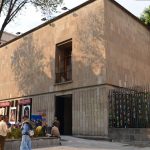
Cercano a 0.07 kms.
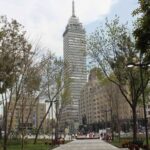
Cercano a 0.10 kms.
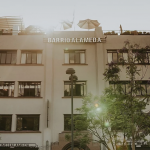
Cercano a 0.10 kms.
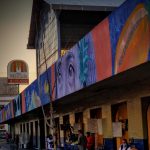
El mercado 2 de abril abrió sus puertas en 1902 y sigue siendo un lugar espectacular para almorzar.

Bellas Artes ha sido durante mucho tiempo un símbolo icónico de la cultura, el arte y las artes escénicas de la Ciudad de México.
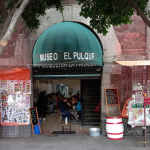
Museo del Pulque en la mítica calzada México-Tacuba...
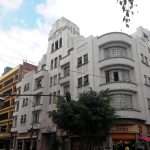
La clásica calle principal de la Ciudad de México llena de gente y comercio...
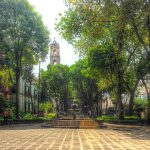
Una de las plazas históricas más hermosas de la Ciudad de México, es un lugar de encuentro para amantes de los libros y comerciantes.